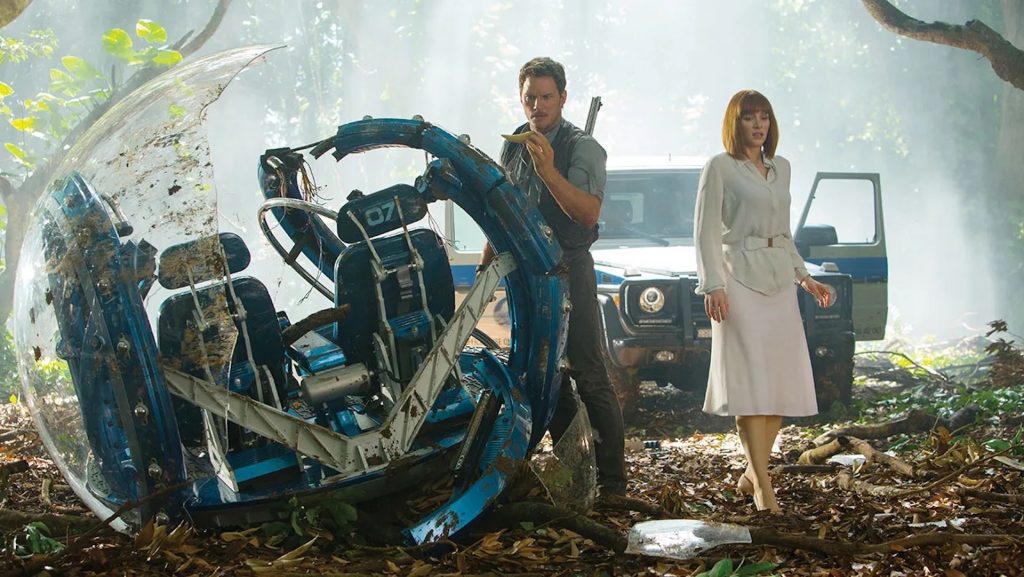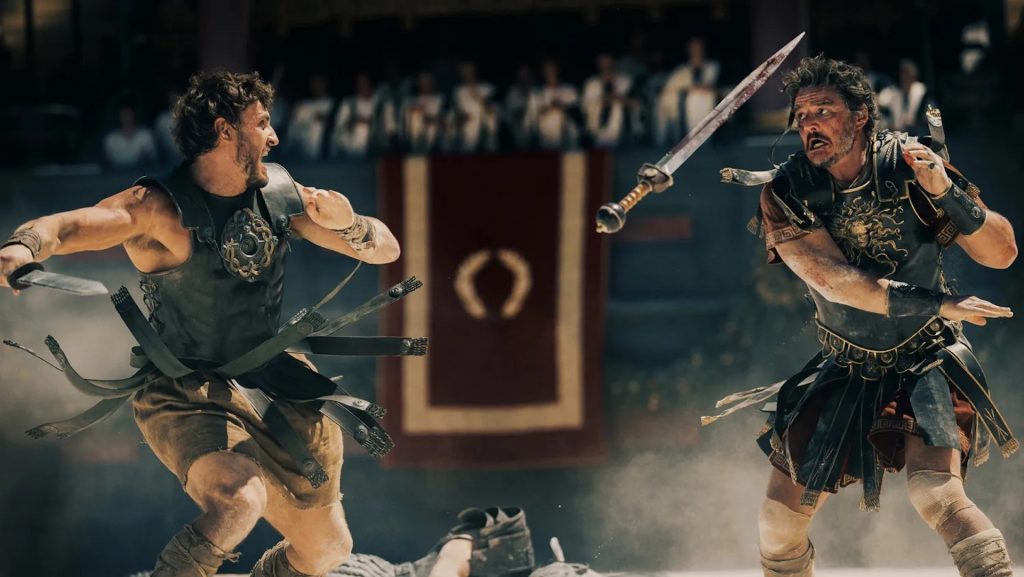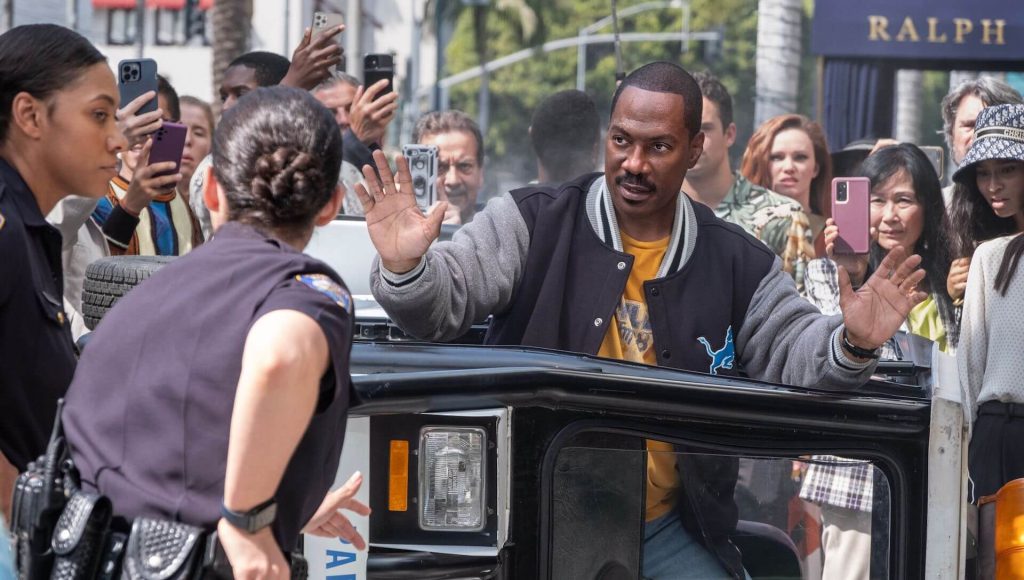Gladiator II has gained a lot of attention since its trailer dropped in early June, quickly becoming Paramount’s most-viewed debut trailer since Top Gun: Maverick. The Ridley Scott-directed legacy sequel to 2000’s Gladiator has reached 177 million views in 48 hours, ranking No. 2 on Google’s US Daily Search Trend list at the 24-hour mark. The trending trailer for this long-awaited movie suggests that legacy sequels have legs in the entertainment industry, and this may be your sign to write one.
What Is a Legacy Sequel?
Hollywood has a long history with sequels, starting over 100 years ago, and legacy sequels have surged in popularity over the past decade. Instead of picking up a previous movie’s threads, a legacy sequel pays homage to the original movie while providing an updated perspective of a cinematic world.
With an established fan base, legacy sequels find a perfect balance between nostalgia and novelty. From Netflix’s Beverly Hills Cop: Axel F to Twisters, older and successful franchises are being tapped for their new potential decades later. Nearly 20 years later, Gladiator is getting its long and highly-anticipated legacy sequel.
The Legacy Sequel Is Almost a Guaranteed Win
Legacy sequels not only appeal greatly to audiences but also attract strong interest from studios. Retapping once popular and successful films and franchises holds a promise of a win while being a lower risk for studios.
Jurassic World, the legacy sequel to Jurassic Park that sparked its own franchise, became a box office monster when it hit theaters in 2015, earning $1.6 billion worldwide. Even without Steven Spielberg, Jurassic World has an energy behind it that captures the same IMAX-worthy and kid-friendly adventures with one of the biggest action stars helming the extended world with new faces nearly 15 years later.
While Jurassic World showed what legacy sequels could do at the box office, Top Gun: Maverick cemented that these nostalgic stories still had legs years later. The film, which sees Maverick ( Cruise) return to the screen to lead a group of TOP GUN pilots for a dangerous mission, grossed $1.49 billion worldwide, making it the second-highest-grossing film of 2022 behind Avatar 2 ($2.32 billion).
Even legacy sequels that are projected to perform poorly at the box office like Twisters, which is eyeing $40 to $50 million during its opening weekend, still have an electrifying buzz around it because of the foundation it was built upon. Audiences crave the rush they felt during the original film, hoping that the legacy sequel can give them something more than good-times nostalgia in a non-superhero blockbuster era.
Sure, there were some legacy sequels like Blade Runner 2049 and The Matrix Resurrections that bombed at the box office, but the success rate of these stories that continue to add to a film’s world proves that they work for audiences and studios. But what makes them work? There are three main factors to consider when writing your own legacy sequel that we can pull from the successful legacy sequels (and maybe even Gladiator II).
Read More: How To Write a Successful Sequel Like ‘Beverly Hills Cop: Axel F’

Should You Write a Legacy Sequel Like ‘Gladiator II’?
3 Reasons Why Legacy Sequels Work
Big-budget franchises are looking to embrace their past while trying to find their future. There are a few ways screenwriters can make great sequels to beloved franchises that open up the world to new possibilities.
Embracing the Original Concept
Richard Fink notes in Movieweb that many legacy sequels “have embraced the concept to tell interesting, thoughtful stories” that “have moved the franchises forward” and “grapple[d] with the idea of nostalgia.” They can do this by incorporating similar themes and tones from the original movie.
Themes are essential to a story’s narrative, carrying the thread throughout the many events that take the characters through their arcs. It is the meaning and the resonance that powers the story. Legacy sequels often center on nostalgia, but they typically borrow other themes from the original film.
The tone also carries weight into the legacy sequel as it shapes the audience’s expectations and perceptions. The writer conveys their attitudes toward the subject and the audience through tone, guiding the audience through the narrative and telling us how to feel in moments.
Gladiator focuses on taking responsibility for your actions and the roles given. As an audience, we are excited to see Maximus (Russell Crowe) overcome impossible situations, inching his way toward killing the man who murdered his wife and child. With Maximus dying at the end of the movie, Gladiator II had no choice but to move on in the world post-Maximus’s legacy.
Lucius (Paul Mescal) is forced into slavery and learns from the legends of Maximus to exact his revenge on the young emperors Caracalla (Fred Hechinger)and Geta (Joseph Quinn) and General Marcus Acacius (Pedro Pascal). While the tone pushing Gladiator forward is a dramatic revenge story, Gladiator II has a tone that is pure action with bigger stunts and a fast-paced story moving through the events of Lucius’s life.
This allows screenwriter David Scarpa to set up expectations by using a formula that has proven to work to draw audiences in. Sure, we can call this nostalgia bait, but audiences want that similar feeling of rooting for the man who was unjustly wronged. Gladiator was an epic story of revenge, so why not do it again with a different cast on a grander scale?
Read More: How to Generate Awesome (and Original) Feature Film Ideas

‘Gladiator II’ (2024)
They Stick With a Genre That Works
The best legacy sequel often works in two genres: action and horror. These are big spectacle films that often fulfill a promise made to the audience by being a genre film. The trailer for Gladiator II shows the Colosseum filled with water, a gag the audience didn’t know was possible in the first film. Beverly Hills Cop: Axel F takes chase sequences to the next level by having Axel (Eddie Murphy) steal a helicopter. In the horror genre, Scream 5 promised bloody kills that echoed the deaths of the first film with a modern twist.
Action films take a few unexpected and thrilling turns, often building up the action to almost death-defying moments that cause the audience to tense up as they watch the deciding moment between the main character’s death or survival. Sure, we knew Maverick and Rooster (Miles Teller) weren’t going to die in that final moment of Top Gun: Maverick, but hope was slim. When they did make it out alive, the audience erupted with cheers of relief. We know what happens when you say Candyman’s name five times, but we are still terrified of what will come when the titular character returns in Nina DeCosta’s legacy sequel.
Legacy sequels work best in these genres because of the established expectations that come. It’s baggage that screenwriters bring with them when they sit down to write any genre piece. But the expectations can also be an inviting challenge to writers who want to see if they can balance genre and nostalgia while telling a new story in an established world. If writers need help nailing those genre beats, ScreenCraft specializes in giving genre notes to help you craft a great story that plays on the tropes.
Read More: Why Genre-Specific Notes Are Better

‘Beverly Hills Cop: Axel F’ (2024)
Not Looking Back With Nostalgic Awe
Some of the best legacy sequels can still tell original stories while benefiting from a tasteful amount of nostalgia. Legacy sequels need to know what made the original film(s) popular and honor the past while charting its own path forward.
When legacy sequels focus too much on their legacy, they quickly bog down the story with fan service moments, which detract from the plot and often make the new characters feel irrelevant compared to the dominating presence of a beloved character. There is also the tricky trap of nostalgia baiting that can feel too unoriginal for an audience who wants to explore more of a movie’s world.
If screenwriters are bringing back an original character into the legacy sequel, consider how time has changed them. In Top Gun: Maverick and Axel F, both main characters are significantly older and are near the end of their careers. The reckless life that made them icons is not possible for these men confronting their age and place in a culture dominated by younger talents. However, this doesn’t mean that they are not still the best at their jobs.
Legacy sequels that step away from the original cast have more freedom to move away from the characters that made the film beloved and find the pieces of the story that made it a hit. Jurassic World and Blade Runner 2049 honor the original films by recreating the tone and themes while boldly telling a new story in a familiar world. The reason why this story needs to be told is up to the screenwriter. Just don’t forget about what came before and how it connects and shapes this new story.

‘Top Gun: Maverick’ (2022)
—
Sequels will always have a place in Hollywood, but legacy sequels have become the great white whale worthy of a screenwriter’s time. Gladiator II didn’t happen overnight; it took Scarpa a while to develop a story that was worthy of being told. Similarly, Top Gun: Maverick took nearly 30 years until Cruise was happy with the screenplay. The lesson for screenwriters is that creating a good legacy sequel takes time and many, many drafts to get right.
To help you along your legacy journey, remember that the best sequels expand the movie’s world while maintaining the themes, tones, and genre that made the first film a hit. This doesn’t necessarily mean you have to bring back characters from the original film. Instead, focus on what highlighted their journey and transfer those elements to a new character worthy of upholding the franchise’s helm.
Read More: 5 Reasons You Should Write a Short Story
Check out our Preparation Notes so you start your story off on the right track!
The post Should You Write a Legacy Sequel Like ‘Gladiator II’? appeared first on ScreenCraft.
Go to Source
Author: Alyssa Miller

